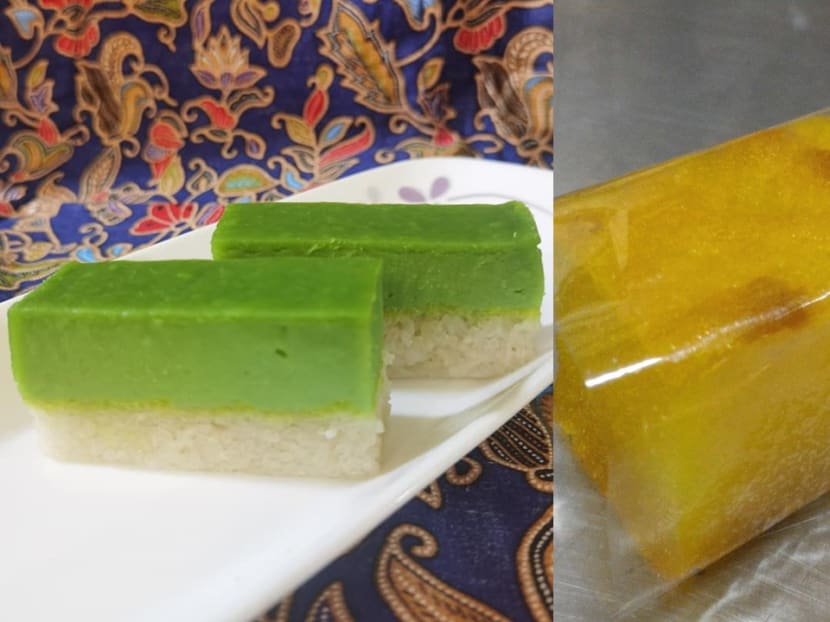9 kueh manufacturers suspended, food items recalled over food additives and allergen concerns: SFA
SINGAPORE — The Singapore Food Agency (SFA) on Tuesday (July 26) suspended the operations of nine kueh manufacturers after it detected high amounts of food additives in their products, and separately ordered the recall of two food items due to the use of an undeclared allergen.

- The Singapore Food Agency suspended the operation of nine kueh manufacturers until further notice
- The agency took action after finding high levels of additives in their products
- Separately, the agency also recalled two products
SINGAPORE — The Singapore Food Agency (SFA) on Tuesday (July 26) suspended the operations of nine kueh manufacturers after it detected high amounts of food additives in their products, and separately ordered the recall of two food items.
The suspension of the nine kueh manufacturers here will last until further notice, SFA said in a statement to the media on Wednesday.
High levels of benzoic or sorbic acid was detected in the kueh and components of the kueh, such as the dough, that were being made by the nine manufacturers.
These acids are common food additives used to preserve food. They are safe for consumption when used in small quantities.
However, under Singapore's food regulations, the use of these additives are banned in kueh products, except for its filling. If used in the filling, they should not exceed the permissible limits set out in the rules.
Kuehs are popular desserts, or snack or steamed "cake" items that can be sweet or savoury, found mostly in Southeast Asian countries such as Indonesia, Malaysia and Singapore.
The suspended manufacturers and the food items affected are:
- Toh Chuan Kee Foodstuff: Kueh lapis, mochi skin
- Tongli Food Manufacturing: Yam cake
- AMK Nonya Kueh: Kueh lapis, red bean kueh lapis, black sesame kueh lapis, yam kueh lapis, kueh salat, tapioca kueh, sweet potato kueh
- Chit Guan Foodstuff: Ang ku kueh (bean paste, peanut and sesame)
- Delight Baker: Pulut hitam, Kueh lapis, chendol kueh, tapioca kueh
- Thomson Foodstuff Manufacturing: Huat kueh
- Sin Hwa Coconuts: Ondeh-ondeh, tapioca kueh
- Tiong Bahru Tian Bo Shui Kueh: Chwee kueh, nine-layer kueh, tapioca kueh
- Lim Food Industries: Png kueh, soon kueh
SFA's latest move follows the suspension of two kueh manufacturers in March owing to the discovery of benzoic acid in their kueh products. The two manufacturers are K & B Nonya Kueh Manufacture and Beng San Food Industry.
“Based on the levels detected, consumption of the affected products once or twice is not of food safety concern. Consumers should not consume food containing high levels of benzoic acid or sorbic acid over a long period of time,” SFA added.
Although the additives were safe when used in small quantities, studies in animals fed with high doses of it had shown nervous system disorder, changes in their brains and reduced growth.
The nine kueh manufacturers have also been ordered to recall kueh products that contain these food additives.
“Consumers who have consumed the implicated products and have concerns about their health should seek medical advice,” the agency said, adding that consumers may contact retailers for enquiries.
TWO FOOD PRODUCTS RECALLED
SFA has also ordered the recall of "Best One" assorted cake (banana flavour) and Bake King’s mixed fruits.
Sorbic acid exceeding the allowed limit was found in the banana-flavoured cake. Sulphur dioxide, an undeclared allergen, was detected in Bake King’s mixed fruits.
“Sorbic acid is a permitted food additive that is used for preservation purposes. Consumption of the affected product is unlikely to pose any adverse health effect due to its low toxicity,” SFA said.
As for the presence of sulphur dioxide in Bake King’s mixed fruits, excessive levels of sulphur dioxide in food could result in allergenic reactions in individuals who are hypersensitive to sulphite.
“The presence of sulphite does not pose a food safety issue to consumers at large, except for those who are allergic to sulphites,” SFA said.
Food products containing ingredients that are known to cause hypersensitivity must be declared on food packaging labels to safeguard public health.
The agency advised consumers who have bought the product and have concerns about their health to not to eat it.
“Consumers may contact their point of purchase for enquiries.”
WHAT ARE BENZOIC AND SORBIC ACIDS?
Professor William Chen, the Michael Fam chair professor in food science and technology at Nanyang Technological University, said that benzoates and sorbates are extensively used in processed food products, especially soft drinks.
The acids do occur in small amounts in nature, but synthetic production of benzoates and sorbates is "well-established, relatively uncomplicated and therefore cheap", the food scientist said.
That is why food manufacturers tend to use them as anti-microbial and anti-fungal preservatives, Prof Chen added.
Benzoic and sorbic acids are relatively safe when consumed in low quantities, though some studies have shown that under certain conditions, these compounds may get mutated to something potentially harmful.
For instance, trace amounts of benzene, a well-known carcinogen, have been detected in soft drinks containing benzoate, Prof Chen said.
A joint expert committee on food additives made up of members from the Food and Agriculture Organization and the World Health Organization have said that the acceptable daily intake for the preservatives are:
- 0 – 5 mg per kilogram body weight a day for benzoic acid (and benzoate salts)
- 0 – 25 mg per kilogram body weight a day for sorbic acid (and sorbate salts)
Prof Chen said that it is strongly recommended not to exceed these limits.
"While food regulatory agencies and manufacturers reference and adhere to these guidelines in product formulation, they have no control over consumer consumption quantities or habits."
When asked if there might be a healthier alternative to benzoic or sorbic acid, Prof Chen said that plant natural products are highly promising replacements, since they marry similar preservative effects with health benefits, whereas benzoates and sorbates have no nutritional or health benefit.
However, the mass production of such plant natural products is prohibitively expensive and environmentally unsustainable. ADDITIONAL REPORTING BY LOW YOUJIN











